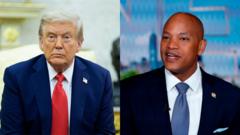Despite Maryland's assertions of declining crime rates, President Trump has threatened to send troops to Baltimore following a contentious invitation from Governor Wes Moore, who recently invited the president to participate in a “safety walk” through the city. On social media, Trump suggested that if Moore needs assistance similar to that provided to Los Angeles by Governor Gavin Newsom, he would be willing to "send in the troops" to help "clean up the crime."
This exchange has further ignited tensions surrounding Trump's broader approach to dealing with crime in Democrat-led cities, where he has signaled a willingness to deploy National Guard troops as part of a policing strategy. The prospect of military involvement in domestic law enforcement has raised alarms among Democrats, who have characterized it as an "abuse of power."
As many as 1,700 National Guardsmen are set to mobilize across 19 states in the upcoming weeks, indicating that this strategy may be an integral part of Trump’s crime-fighting agenda. Governor Moore, a vocal critic of the president's plan, referred to Trump's comments as “tone deaf” and indicative of someone who has not truly engaged with the challenges faced by communities like Baltimore.
Trump's remarks were made in response to what he labeled a "nasty" invitation from Moore, which he perceived as provocative. He countered that before accepting an invitation to walk in Baltimore, the city's crime issues needed to be addressed.
In Washington D.C., where Trump has already deployed around 2,000 troops, officials report significant arrests since the operation commenced. The president claimed that the increased military presence created a safer environment, portraying it as a successful method of restoring order.
However, statistics from the Metropolitan Police Department in D.C. report a decrease in violent crimes, suggesting that the situation may not be as desperate as the president implies. Preliminary data indicates a 26% decline in violent crimes compared to the previous year, leading many to question the necessity of troop deployments.
Trump also hinted at deploying troops to other cities like New York and Chicago, drawing condemnation from local leaders. Illinois Governor JB Pritzker has decried such deployments, while House Minority Leader Hakeem Jeffries pointed out that the president lacks the authority to unilaterally send military forces into civilian areas.
Recent polling reveals a strong opposition among city residents to the deployment of both federal officers and National Guard troops, with around 80% expressing disapproval. As discussions around crime and public safety continue, the implications of military presence in urban areas remain a contentious topic in American politics.
This exchange has further ignited tensions surrounding Trump's broader approach to dealing with crime in Democrat-led cities, where he has signaled a willingness to deploy National Guard troops as part of a policing strategy. The prospect of military involvement in domestic law enforcement has raised alarms among Democrats, who have characterized it as an "abuse of power."
As many as 1,700 National Guardsmen are set to mobilize across 19 states in the upcoming weeks, indicating that this strategy may be an integral part of Trump’s crime-fighting agenda. Governor Moore, a vocal critic of the president's plan, referred to Trump's comments as “tone deaf” and indicative of someone who has not truly engaged with the challenges faced by communities like Baltimore.
Trump's remarks were made in response to what he labeled a "nasty" invitation from Moore, which he perceived as provocative. He countered that before accepting an invitation to walk in Baltimore, the city's crime issues needed to be addressed.
In Washington D.C., where Trump has already deployed around 2,000 troops, officials report significant arrests since the operation commenced. The president claimed that the increased military presence created a safer environment, portraying it as a successful method of restoring order.
However, statistics from the Metropolitan Police Department in D.C. report a decrease in violent crimes, suggesting that the situation may not be as desperate as the president implies. Preliminary data indicates a 26% decline in violent crimes compared to the previous year, leading many to question the necessity of troop deployments.
Trump also hinted at deploying troops to other cities like New York and Chicago, drawing condemnation from local leaders. Illinois Governor JB Pritzker has decried such deployments, while House Minority Leader Hakeem Jeffries pointed out that the president lacks the authority to unilaterally send military forces into civilian areas.
Recent polling reveals a strong opposition among city residents to the deployment of both federal officers and National Guard troops, with around 80% expressing disapproval. As discussions around crime and public safety continue, the implications of military presence in urban areas remain a contentious topic in American politics.






















